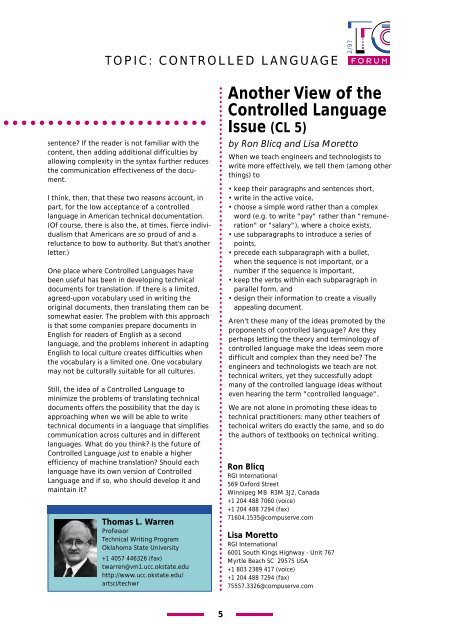TC Forum 97-2
TC Forum 97-2
TC Forum 97-2
You also want an ePaper? Increase the reach of your titles
YUMPU automatically turns print PDFs into web optimized ePapers that Google loves.
TOPIC: CONTROLLED LANGUAGE<br />
sentence? If the reader is not familiar with the<br />
content, then adding additional difficulties by<br />
allowing complexity in the syntax further reduces<br />
the communication effectiveness of the document.<br />
I think, then, that these two reasons account, in<br />
part, for the low acceptance of a controlled<br />
language in American technical documentation.<br />
(Of course, there is also the, at times, fierce individualism<br />
that Americans are so proud of and a<br />
reluctance to bow to authority. But that’s another<br />
letter.)<br />
One place where Controlled Languages have<br />
been useful has been in developing technical<br />
documents for translation. If there is a limited,<br />
agreed-upon vocabulary used in writing the<br />
original documents, then translating them can be<br />
somewhat easier. The problem with this approach<br />
is that some companies prepare documents in<br />
English for readers of English as a second<br />
language, and the problems inherent in adapting<br />
English to local culture creates difficulties when<br />
the vocabulary is a limited one. One vocabulary<br />
may not be culturally suitable for all cultures.<br />
Still, the idea of a Controlled Language to<br />
minimize the problems of translating technical<br />
documents offers the possibility that the day is<br />
approaching when we will be able to write<br />
technical documents in a language that simplifies<br />
communication across cultures and in different<br />
languages. What do you think? Is the future of<br />
Controlled Language just to enable a higher<br />
efficiency of machine translation? Should each<br />
language have its own version of Controlled<br />
Language and if so, who should develop it and<br />
maintain it?<br />
Thomas L. Warren<br />
Professor<br />
Technical Writing Program<br />
Oklahoma State University<br />
+1 4057 446326 (fax)<br />
twarren@vm1.ucc.okstate.edu<br />
http://www.ucc.okstate.edu/<br />
artsci/techwr<br />
5<br />
2/<strong>97</strong><br />
Another View of the<br />
Controlled Language<br />
Issue (CL 5)<br />
by Ron Blicq and Lisa Moretto<br />
When we teach engineers and technologists to<br />
write more effectively, we tell them (among other<br />
things) to<br />
• keep their paragraphs and sentences short,<br />
• write in the active voice,<br />
• choose a simple word rather than a complex<br />
word (e.g. to write "pay" rather than "remuneration"<br />
or "salary"), where a choice exists,<br />
• use subparagraphs to introduce a series of<br />
points,<br />
• precede each subparagraph with a bullet,<br />
when the sequence is not important, or a<br />
number if the sequence is important,<br />
• keep the verbs within each subparagraph in<br />
parallel form, and<br />
• design their information to create a visually<br />
appealing document.<br />
Aren’t these many of the ideas promoted by the<br />
proponents of controlled language? Are they<br />
perhaps letting the theory and terminology of<br />
controlled language make the ideas seem more<br />
difficult and complex than they need be? The<br />
engineers and technologists we teach are not<br />
technical writers, yet they successfully adopt<br />
many of the controlled language ideas without<br />
even hearing the term "controlled language".<br />
We are not alone in promoting these ideas to<br />
technical practitioners: many other teachers of<br />
technical writers do exactly the same, and so do<br />
the authors of textbooks on technical writing.<br />
Ron Blicq<br />
RGI International<br />
569 Oxford Street<br />
Winnipeg MB R3M 3J2, Canada<br />
+1 204 488 7060 (voice)<br />
+1 204 488 7294 (fax)<br />
71604.1535@compuserve.com<br />
Lisa Moretto<br />
RGI International<br />
6001 South Kings Highway - Unit 767<br />
Myrtle Beach SC 29575 USA<br />
+1 803 2389 417 (voice)<br />
+1 204 488 7294 (fax)<br />
75557.3326@compuserve.com


